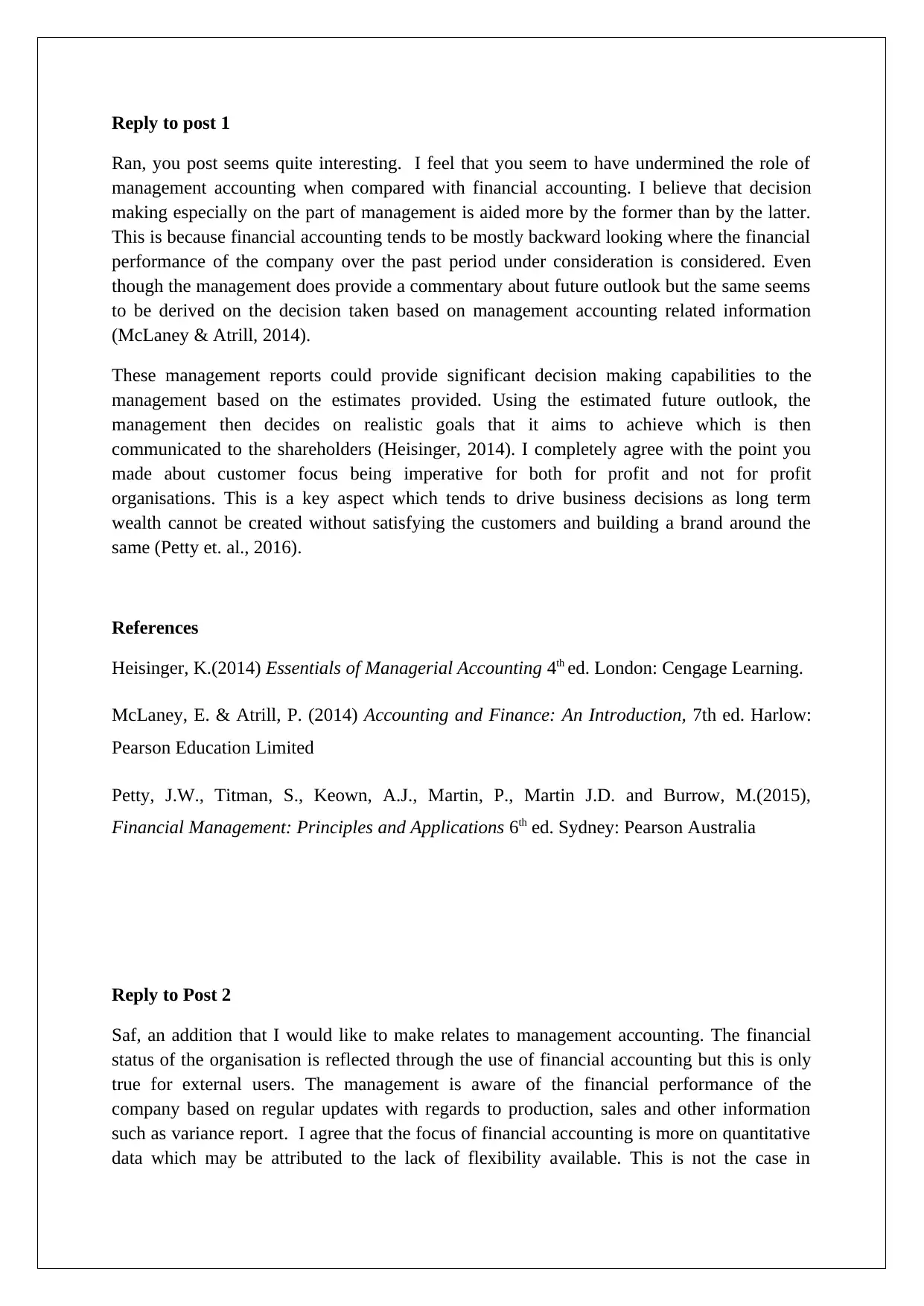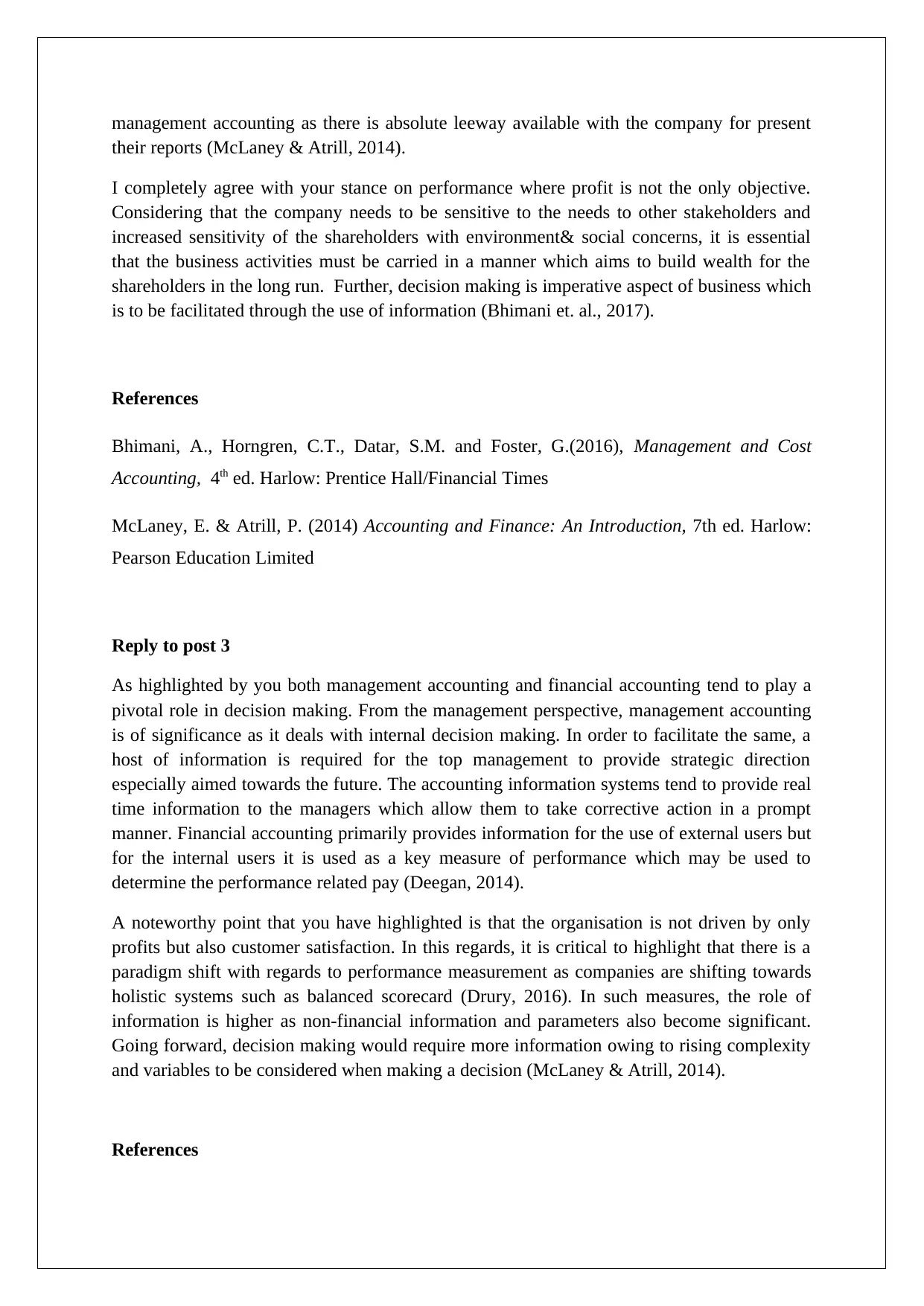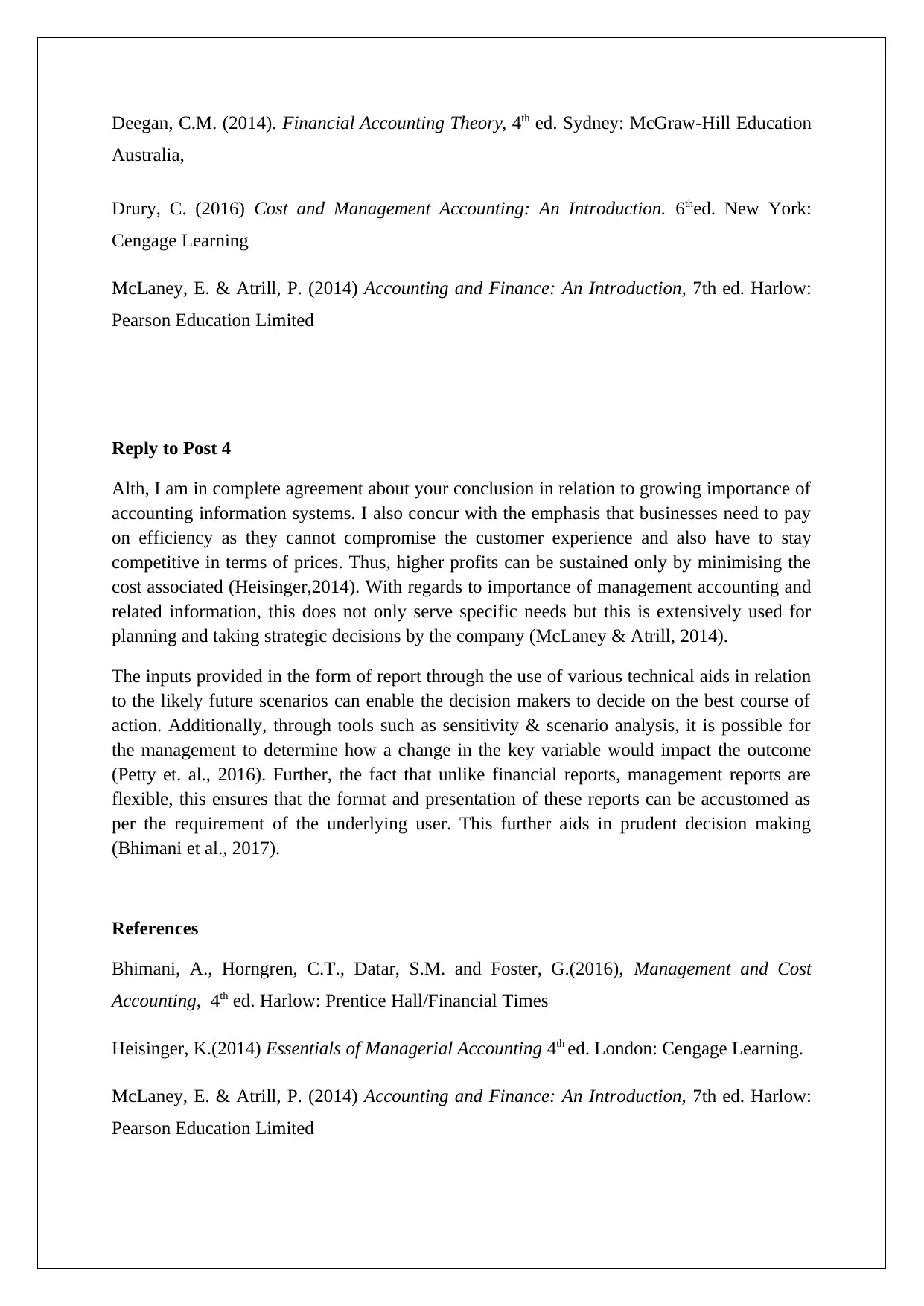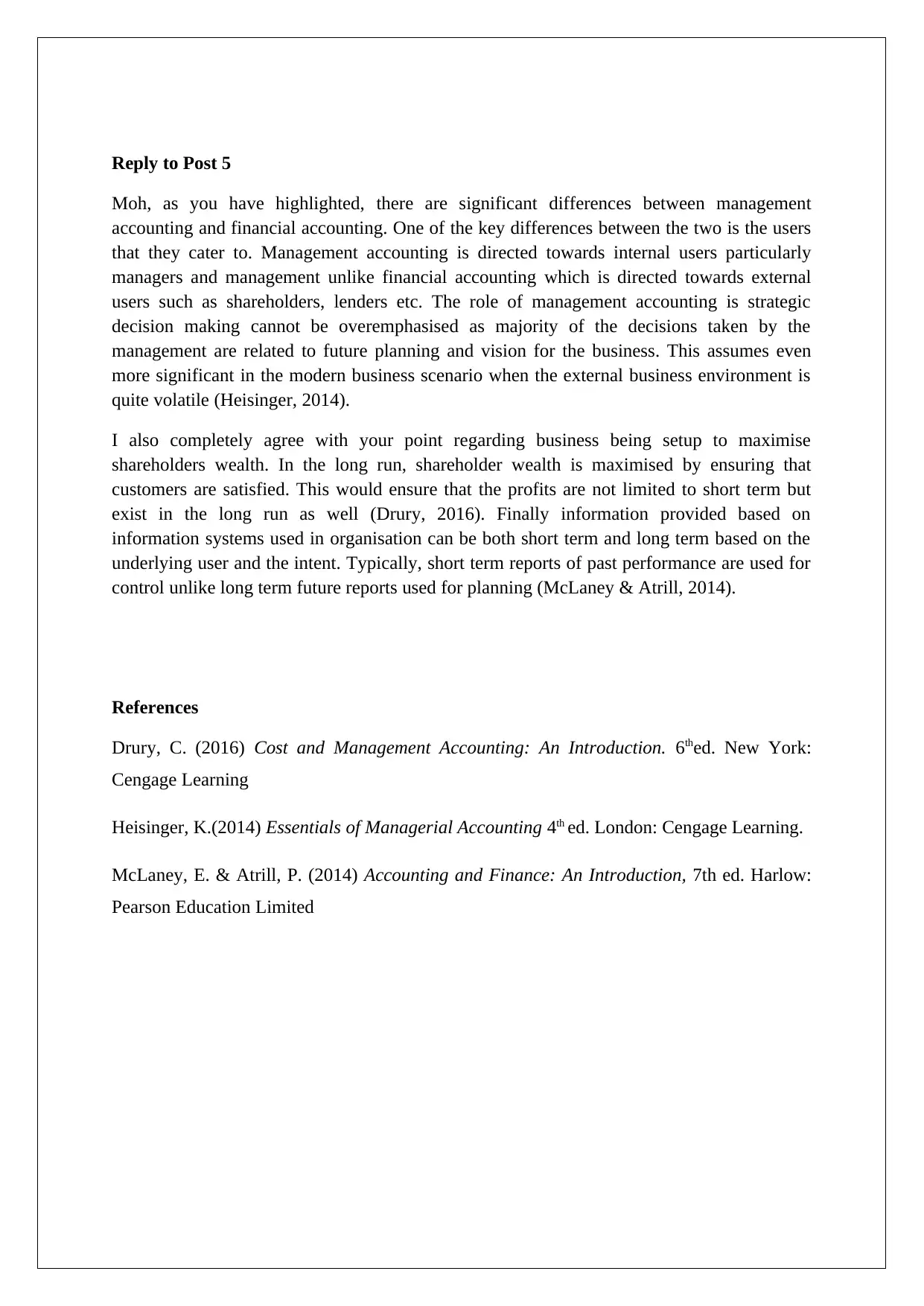Analyzing the Differences: Management vs. Financial Accounting
VerifiedAdded on 2022/10/02
|4
|1517
|395
Discussion Board Post
AI Summary
This assignment comprises a series of discussion board replies, analyzing the differences between management and financial accounting. The responses highlight that management accounting is crucial for internal decision-making, providing real-time information for strategic direction and performance evaluation, while financial accounting caters to external users, offering a backward-looking perspective. The discussion emphasizes customer satisfaction as a key driver of business decisions and the importance of both quantitative and non-financial information in performance measurement. The replies also underscore the significance of accounting information systems in facilitating informed decisions and the shift towards holistic performance measurement systems like the balanced scorecard. The flexibility of management reports is also discussed, highlighting their adaptability to the needs of the underlying user and their role in prudent decision-making. Several references are used to support the arguments presented in the replies.

Reply to post 1
Ran, you post seems quite interesting. I feel that you seem to have undermined the role of
management accounting when compared with financial accounting. I believe that decision
making especially on the part of management is aided more by the former than by the latter.
This is because financial accounting tends to be mostly backward looking where the financial
performance of the company over the past period under consideration is considered. Even
though the management does provide a commentary about future outlook but the same seems
to be derived on the decision taken based on management accounting related information
(McLaney & Atrill, 2014).
These management reports could provide significant decision making capabilities to the
management based on the estimates provided. Using the estimated future outlook, the
management then decides on realistic goals that it aims to achieve which is then
communicated to the shareholders (Heisinger, 2014). I completely agree with the point you
made about customer focus being imperative for both for profit and not for profit
organisations. This is a key aspect which tends to drive business decisions as long term
wealth cannot be created without satisfying the customers and building a brand around the
same (Petty et. al., 2016).
References
Heisinger, K.(2014) Essentials of Managerial Accounting 4th ed. London: Cengage Learning.
McLaney, E. & Atrill, P. (2014) Accounting and Finance: An Introduction, 7th ed. Harlow:
Pearson Education Limited
Petty, J.W., Titman, S., Keown, A.J., Martin, P., Martin J.D. and Burrow, M.(2015),
Financial Management: Principles and Applications 6th ed. Sydney: Pearson Australia
Reply to Post 2
Saf, an addition that I would like to make relates to management accounting. The financial
status of the organisation is reflected through the use of financial accounting but this is only
true for external users. The management is aware of the financial performance of the
company based on regular updates with regards to production, sales and other information
such as variance report. I agree that the focus of financial accounting is more on quantitative
data which may be attributed to the lack of flexibility available. This is not the case in
Ran, you post seems quite interesting. I feel that you seem to have undermined the role of
management accounting when compared with financial accounting. I believe that decision
making especially on the part of management is aided more by the former than by the latter.
This is because financial accounting tends to be mostly backward looking where the financial
performance of the company over the past period under consideration is considered. Even
though the management does provide a commentary about future outlook but the same seems
to be derived on the decision taken based on management accounting related information
(McLaney & Atrill, 2014).
These management reports could provide significant decision making capabilities to the
management based on the estimates provided. Using the estimated future outlook, the
management then decides on realistic goals that it aims to achieve which is then
communicated to the shareholders (Heisinger, 2014). I completely agree with the point you
made about customer focus being imperative for both for profit and not for profit
organisations. This is a key aspect which tends to drive business decisions as long term
wealth cannot be created without satisfying the customers and building a brand around the
same (Petty et. al., 2016).
References
Heisinger, K.(2014) Essentials of Managerial Accounting 4th ed. London: Cengage Learning.
McLaney, E. & Atrill, P. (2014) Accounting and Finance: An Introduction, 7th ed. Harlow:
Pearson Education Limited
Petty, J.W., Titman, S., Keown, A.J., Martin, P., Martin J.D. and Burrow, M.(2015),
Financial Management: Principles and Applications 6th ed. Sydney: Pearson Australia
Reply to Post 2
Saf, an addition that I would like to make relates to management accounting. The financial
status of the organisation is reflected through the use of financial accounting but this is only
true for external users. The management is aware of the financial performance of the
company based on regular updates with regards to production, sales and other information
such as variance report. I agree that the focus of financial accounting is more on quantitative
data which may be attributed to the lack of flexibility available. This is not the case in
Paraphrase This Document
Need a fresh take? Get an instant paraphrase of this document with our AI Paraphraser

management accounting as there is absolute leeway available with the company for present
their reports (McLaney & Atrill, 2014).
I completely agree with your stance on performance where profit is not the only objective.
Considering that the company needs to be sensitive to the needs to other stakeholders and
increased sensitivity of the shareholders with environment& social concerns, it is essential
that the business activities must be carried in a manner which aims to build wealth for the
shareholders in the long run. Further, decision making is imperative aspect of business which
is to be facilitated through the use of information (Bhimani et. al., 2017).
References
Bhimani, A., Horngren, C.T., Datar, S.M. and Foster, G.(2016), Management and Cost
Accounting, 4th ed. Harlow: Prentice Hall/Financial Times
McLaney, E. & Atrill, P. (2014) Accounting and Finance: An Introduction, 7th ed. Harlow:
Pearson Education Limited
Reply to post 3
As highlighted by you both management accounting and financial accounting tend to play a
pivotal role in decision making. From the management perspective, management accounting
is of significance as it deals with internal decision making. In order to facilitate the same, a
host of information is required for the top management to provide strategic direction
especially aimed towards the future. The accounting information systems tend to provide real
time information to the managers which allow them to take corrective action in a prompt
manner. Financial accounting primarily provides information for the use of external users but
for the internal users it is used as a key measure of performance which may be used to
determine the performance related pay (Deegan, 2014).
A noteworthy point that you have highlighted is that the organisation is not driven by only
profits but also customer satisfaction. In this regards, it is critical to highlight that there is a
paradigm shift with regards to performance measurement as companies are shifting towards
holistic systems such as balanced scorecard (Drury, 2016). In such measures, the role of
information is higher as non-financial information and parameters also become significant.
Going forward, decision making would require more information owing to rising complexity
and variables to be considered when making a decision (McLaney & Atrill, 2014).
References
their reports (McLaney & Atrill, 2014).
I completely agree with your stance on performance where profit is not the only objective.
Considering that the company needs to be sensitive to the needs to other stakeholders and
increased sensitivity of the shareholders with environment& social concerns, it is essential
that the business activities must be carried in a manner which aims to build wealth for the
shareholders in the long run. Further, decision making is imperative aspect of business which
is to be facilitated through the use of information (Bhimani et. al., 2017).
References
Bhimani, A., Horngren, C.T., Datar, S.M. and Foster, G.(2016), Management and Cost
Accounting, 4th ed. Harlow: Prentice Hall/Financial Times
McLaney, E. & Atrill, P. (2014) Accounting and Finance: An Introduction, 7th ed. Harlow:
Pearson Education Limited
Reply to post 3
As highlighted by you both management accounting and financial accounting tend to play a
pivotal role in decision making. From the management perspective, management accounting
is of significance as it deals with internal decision making. In order to facilitate the same, a
host of information is required for the top management to provide strategic direction
especially aimed towards the future. The accounting information systems tend to provide real
time information to the managers which allow them to take corrective action in a prompt
manner. Financial accounting primarily provides information for the use of external users but
for the internal users it is used as a key measure of performance which may be used to
determine the performance related pay (Deegan, 2014).
A noteworthy point that you have highlighted is that the organisation is not driven by only
profits but also customer satisfaction. In this regards, it is critical to highlight that there is a
paradigm shift with regards to performance measurement as companies are shifting towards
holistic systems such as balanced scorecard (Drury, 2016). In such measures, the role of
information is higher as non-financial information and parameters also become significant.
Going forward, decision making would require more information owing to rising complexity
and variables to be considered when making a decision (McLaney & Atrill, 2014).
References

Deegan, C.M. (2014). Financial Accounting Theory, 4th ed. Sydney: McGraw-Hill Education
Australia,
Drury, C. (2016) Cost and Management Accounting: An Introduction. 6thed. New York:
Cengage Learning
McLaney, E. & Atrill, P. (2014) Accounting and Finance: An Introduction, 7th ed. Harlow:
Pearson Education Limited
Reply to Post 4
Alth, I am in complete agreement about your conclusion in relation to growing importance of
accounting information systems. I also concur with the emphasis that businesses need to pay
on efficiency as they cannot compromise the customer experience and also have to stay
competitive in terms of prices. Thus, higher profits can be sustained only by minimising the
cost associated (Heisinger,2014). With regards to importance of management accounting and
related information, this does not only serve specific needs but this is extensively used for
planning and taking strategic decisions by the company (McLaney & Atrill, 2014).
The inputs provided in the form of report through the use of various technical aids in relation
to the likely future scenarios can enable the decision makers to decide on the best course of
action. Additionally, through tools such as sensitivity & scenario analysis, it is possible for
the management to determine how a change in the key variable would impact the outcome
(Petty et. al., 2016). Further, the fact that unlike financial reports, management reports are
flexible, this ensures that the format and presentation of these reports can be accustomed as
per the requirement of the underlying user. This further aids in prudent decision making
(Bhimani et al., 2017).
References
Bhimani, A., Horngren, C.T., Datar, S.M. and Foster, G.(2016), Management and Cost
Accounting, 4th ed. Harlow: Prentice Hall/Financial Times
Heisinger, K.(2014) Essentials of Managerial Accounting 4th ed. London: Cengage Learning.
McLaney, E. & Atrill, P. (2014) Accounting and Finance: An Introduction, 7th ed. Harlow:
Pearson Education Limited
Australia,
Drury, C. (2016) Cost and Management Accounting: An Introduction. 6thed. New York:
Cengage Learning
McLaney, E. & Atrill, P. (2014) Accounting and Finance: An Introduction, 7th ed. Harlow:
Pearson Education Limited
Reply to Post 4
Alth, I am in complete agreement about your conclusion in relation to growing importance of
accounting information systems. I also concur with the emphasis that businesses need to pay
on efficiency as they cannot compromise the customer experience and also have to stay
competitive in terms of prices. Thus, higher profits can be sustained only by minimising the
cost associated (Heisinger,2014). With regards to importance of management accounting and
related information, this does not only serve specific needs but this is extensively used for
planning and taking strategic decisions by the company (McLaney & Atrill, 2014).
The inputs provided in the form of report through the use of various technical aids in relation
to the likely future scenarios can enable the decision makers to decide on the best course of
action. Additionally, through tools such as sensitivity & scenario analysis, it is possible for
the management to determine how a change in the key variable would impact the outcome
(Petty et. al., 2016). Further, the fact that unlike financial reports, management reports are
flexible, this ensures that the format and presentation of these reports can be accustomed as
per the requirement of the underlying user. This further aids in prudent decision making
(Bhimani et al., 2017).
References
Bhimani, A., Horngren, C.T., Datar, S.M. and Foster, G.(2016), Management and Cost
Accounting, 4th ed. Harlow: Prentice Hall/Financial Times
Heisinger, K.(2014) Essentials of Managerial Accounting 4th ed. London: Cengage Learning.
McLaney, E. & Atrill, P. (2014) Accounting and Finance: An Introduction, 7th ed. Harlow:
Pearson Education Limited
⊘ This is a preview!⊘
Do you want full access?
Subscribe today to unlock all pages.

Trusted by 1+ million students worldwide

Reply to Post 5
Moh, as you have highlighted, there are significant differences between management
accounting and financial accounting. One of the key differences between the two is the users
that they cater to. Management accounting is directed towards internal users particularly
managers and management unlike financial accounting which is directed towards external
users such as shareholders, lenders etc. The role of management accounting is strategic
decision making cannot be overemphasised as majority of the decisions taken by the
management are related to future planning and vision for the business. This assumes even
more significant in the modern business scenario when the external business environment is
quite volatile (Heisinger, 2014).
I also completely agree with your point regarding business being setup to maximise
shareholders wealth. In the long run, shareholder wealth is maximised by ensuring that
customers are satisfied. This would ensure that the profits are not limited to short term but
exist in the long run as well (Drury, 2016). Finally information provided based on
information systems used in organisation can be both short term and long term based on the
underlying user and the intent. Typically, short term reports of past performance are used for
control unlike long term future reports used for planning (McLaney & Atrill, 2014).
References
Drury, C. (2016) Cost and Management Accounting: An Introduction. 6thed. New York:
Cengage Learning
Heisinger, K.(2014) Essentials of Managerial Accounting 4th ed. London: Cengage Learning.
McLaney, E. & Atrill, P. (2014) Accounting and Finance: An Introduction, 7th ed. Harlow:
Pearson Education Limited
Moh, as you have highlighted, there are significant differences between management
accounting and financial accounting. One of the key differences between the two is the users
that they cater to. Management accounting is directed towards internal users particularly
managers and management unlike financial accounting which is directed towards external
users such as shareholders, lenders etc. The role of management accounting is strategic
decision making cannot be overemphasised as majority of the decisions taken by the
management are related to future planning and vision for the business. This assumes even
more significant in the modern business scenario when the external business environment is
quite volatile (Heisinger, 2014).
I also completely agree with your point regarding business being setup to maximise
shareholders wealth. In the long run, shareholder wealth is maximised by ensuring that
customers are satisfied. This would ensure that the profits are not limited to short term but
exist in the long run as well (Drury, 2016). Finally information provided based on
information systems used in organisation can be both short term and long term based on the
underlying user and the intent. Typically, short term reports of past performance are used for
control unlike long term future reports used for planning (McLaney & Atrill, 2014).
References
Drury, C. (2016) Cost and Management Accounting: An Introduction. 6thed. New York:
Cengage Learning
Heisinger, K.(2014) Essentials of Managerial Accounting 4th ed. London: Cengage Learning.
McLaney, E. & Atrill, P. (2014) Accounting and Finance: An Introduction, 7th ed. Harlow:
Pearson Education Limited
1 out of 4
Related Documents
Your All-in-One AI-Powered Toolkit for Academic Success.
+13062052269
info@desklib.com
Available 24*7 on WhatsApp / Email
![[object Object]](/_next/static/media/star-bottom.7253800d.svg)
Unlock your academic potential
Copyright © 2020–2026 A2Z Services. All Rights Reserved. Developed and managed by ZUCOL.



